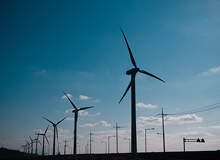
The power industry is heading into a landmark period in its history. As the world works to combat climate change, renewable energy technologies and nuclear options are picking up steam. It is a complex time for those seeking employment in the industry as the short-term future for renewable and nuclear power is still unclear, but opportunities still abound. In this feature, we look into prominent recruitment trends across power generation sectors.
An aging workforce
In common with many heavy, engineering-based industries like oil and gas and mining, the power industry is running low on new starters, especially in the developed world. And the old guard is getting older. According to statistics from the US Bureau of Labor, over 30% of the power industry’s current workforce will reach retirement age within the next few years. On top of that, power engineering degree graduations have been on the slide, falling to around 500 per year from a 1980s peak of approximately 2,000.
What does this mean for the recruitment market? Given that experts have predicted that by 2012, there could be 10,000 more utility jobs than available workers, companies will have to be more proactive in their efforts to bring talent into the industry. This could come in the form of higher entry-level salaries, or more developed industry education programmes. One example of the latter is the Energy Providers Coalition for Education, a US industry consortium that provides online education programmes to encourage young people to consider an energy career.
BRIC expansion provokes job surge
The rapidly industrialising BRIC nations of Brazil, Russia, India and China are moving into a period of unbridled development, and demand for power is spiking as a result. This means that salaries are rising and industry recruitment has never been stronger.
Taking India as an example, the country’s peak-hour demand by 2020 has been estimated at around 350GW, a statistic that has prompted the Indian Government to enact a plan to add 78,000MW of extra capacity to the grid over the next five years. The Central Electricity Authority has estimated that around 800,000 workers will be required to maintain this level of growth. Sankaranarayanan Padmanabhan of Tata Power told the Economic Times last year that: “The industry will require around 40,000 engineers for core sectors such as electrical, mechanical and instrumentation every year. We are planning campus recruitment as well as hiring from the industry.” The so-called ultra mega power projects (UMPPs) being carried out by the likes of Tata and Reliance Power are hovering up manpower with particular speed.
Renewable and nuclear opportunities
Recent reports indicate that the burgeoning renewable energy sector is on the rise, and on the lookout for fresh talent. Industry experts have predicted that the size of the renewable energy market will surpass the oil and gas industry within the next ten years. According to UK-based renewable energy association RenewableUK, as jobs fall in oil and gas and oil companies start diversifying into renewable marine technologies, recruitment will rise in the renewables sector. The organisation has estimated that 60,000 renewable energy jobs will be created by 2020.
How well do you really know your competitors?
Access the most comprehensive Company Profiles on the market, powered by GlobalData. Save hours of research. Gain competitive edge.

Thank you!
Your download email will arrive shortly
Not ready to buy yet? Download a free sample
We are confident about the unique quality of our Company Profiles. However, we want you to make the most beneficial decision for your business, so we offer a free sample that you can download by submitting the below form
By GlobalDataAccording to a February 2011 report on wind energy recruitment by Allen & York, the wind energy market will grow from employing around 154,000 people at present to 212,000 by the end of 2015. In Europe, the report cites the UK as one of the industry leaders in industrial wind power, with Germany, Denmark, Spain and France among the EU’s top employers. Central and Eastern Europe is reported as an area with particular potential for expansion in this field. As renewables continue to develop, skill sets required by the industry are getting broader, meaning that transferable skills and adaptability will be vital to success.
In the wake of the tsunami in Japan and the subsequent Fukushima nuclear power plant crisis, a question mark still hangs over the future prospects of nuclear power, with Germany and Italy cancelling nuclear projects in response. This could lead to greater prioritisation and investment in renewable development as countries shift away from nuclear as an alternative, but with major nuclear projects still going ahead as planned in France, the UK and the US among others, there is a strong chance that nuclear power will be able to move on from Fukushima and continue its growth.






